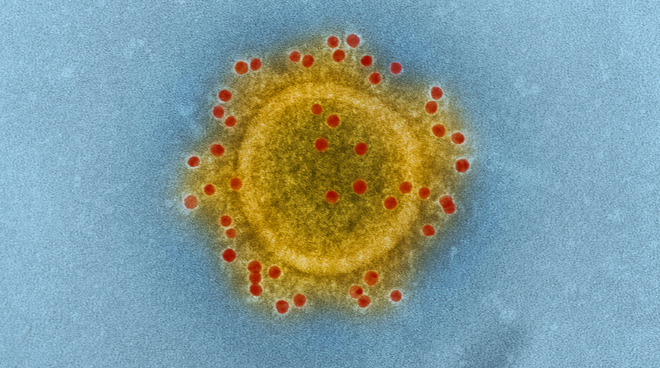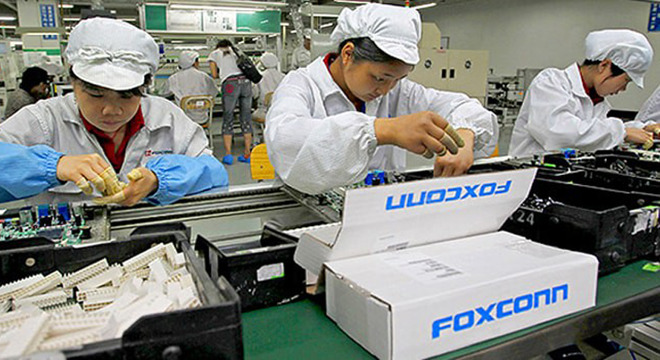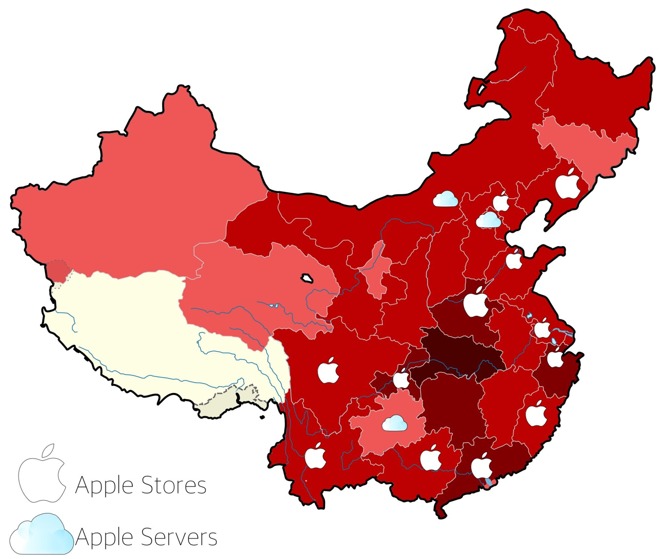
A coronavirus, which can be identified by its crown-like halo
The city of Wuhan, China has begun enforcing strict rules aimed at minimizing the spread of the new disease, which has claimed 80 lives before January 27 according to the Chinese government. Public transit has shut down, businesses and schools are closed, holiday celebrations have been cancelled, and any travel in or out of the city has been expressly forbidden.
Apple supplier Foxconn has ordered employees who were visiting Taiwan for the Chinese New Year to extend their stay and not return to their Wuhan plant in China, according to Straitstimes. A factory, such as the ones Foxconn operates, could quickly become overrun with an outbreak, potentially putting workers at unnecessary risk and effectively shutting down production.
-l.jpg)
-l.jpg)
-l.jpg)
-l.jpg)
Foxconn locations overlaid on Coronavirus infections, the deeper red, the more infections - infection data provided by Wikipedia
In addition to asking many employees to stay at home, Foxconn has ramped up employee health monitoring in their Wuhan factory. Foxconn has provided employees with face masks to prevent the spread of the virus. Employees must also have their temperature checked daily, as one of the first symptoms of the illness is a fever.
But, monitoring for fever may not be enough. Present information about the virus suggests that contagion can be spread for days before a fever develops.
Understanding 2019-nCoV
The 2019 Novel Coronavirus, termed “2019-nCoV” for short, is a type of coronavirus responsible for causing respiratory distress in the infected. Symptoms are typically flu-like, with a fever, cough, and shortness of breath. Those infected usually go on to develop pneumonia.
Other diseases caused by coronaviruses include severe acute respiratory syndrome (SARS) and Middle East respiratory syndrome coronavirus (MERS). SARS, MERS, and now 2019-nCoV are global outbreaks.
Like most coronaviruses, it’s thought that the virus mutated from a strain that only infected animals, to one capable of infecting humans.
According to the CDC, 2019-nCoV was first detected on December 8, 2019, in Wuhan City, Hubei Province in China, and has been expanding into other areas. In China, there have been nearly 2,800 confirmed cases of the 2019-nCoV and 80 fatalities.
At present, 2019-nCoV is thought to have a mortality rate of around four percent in total, significantly less than SARS, which was 10 percent, and MERS with mortality rates as high a 35 percent. For context, the 2018-2019 outbreak of flu had a mortality rate of just under seven percent for those hospitalized, according to the CDC.
As with most respiratory illnesses, those at greatest risk are children under three and adults over 65. Many of the deaths in the 2019-nCoV outbreak have been those who already had pre-existing conditions that would have made fighting the virus much more difficult, including diabetes, high blood pressure, and heart disease.
2019-nCoV seemingly spreads very quickly. Between January 25 and January 26, over 400 new cases were confirmed. Since its discovery on December 8, 2019, there have been nearly 2,800 confirmed cases. Experts are not sure how the virus spreads from person to person, 2019-nCoV is thought to spread like most other respiratory illnesses —from contact with saliva and mucus.
Those who have the disease are contagious for a few days before they show symptoms, and those who become infected may not show symptoms until 14 days after exposure. Complicating this, is the China government’s historical under-reporting of cases —so in this early stage, many data points are not yet clear.




Foxconn factory workers often work in very close contact with each other
Incredibly dense population centers, such as Wuhan, are the ideal location for outbreaks to start. Wuhan has 11 million people in the city proper, with a metropolis region of over 19 million people. Especially densely populated areas, such as factories, schools, and tourism hot-spots are at greatest risk for spreading the disease between people.
2019 n-COV Management
At the time of reporting, there’s no vaccine for 2019-nCoV, though researchers are attempting to develop one. Those who become infected are placed in quarantine and provided with medical care to help manage their symptoms.
Those who aren’t infected are encouraged to avoid contact with anyone who is symptomatic. Health organizations, such as the CDC and WHO, have recommended that everyone brush up on handwashing practices.
Tim Cook has announced that Apple will donate money to groups on the ground helping to support those affected by the 2019-nCoV.
What an outbreak means for Apple
Apple has three main businesses and concerns in China. There are iCloud data centers, a large Apple retail presence, and a larger manufacturing base mostly driven by Foxconn.




Apple locations overlaid on Coronavirus infections, the deeper the red, the more infections - infection data provided by Wikipedia
Apple’s iCloud
Apple Cloud centers are not expected to be heavily impacted by 2019-nCoV. Data centers, while large, are often not staffed with many people and the people there are mostly used in a crisis, as opposed to steady-state operation.
Additionally, data centers require less maintenance than something like a store, and could operate with fewer employees if needed, potentially for long periods of time.
Apple retail
Beyond staffing concerns, Apple Stores will likely see decreased customers during the height of the outbreak. As a result, this means lower sales in the region as the disease spreads.
Apple has no stores in Wuhan. And, effective on January 27, it has cut the operating hours for stores across mainland China.
Apple has pre-existing concerns maintaining strong sales —especially in mainland China. The 2019-nCoV outbreak could slow down any potential growth in the Chinese market. It’s also probable that other smartphone suppliers —and the economy at large —will see a measurable decrease in revenue.
Foxconn factories and Apple Mac, iPad, and iPhone production
At this time, in late January 2020, it is impossible to know how long the outbreak of the 2019 Novel Coronavirus will last. The 2002 SARS outbreak lasted roughly six months —and Apple was much smaller then. If the 2019 Novel Coronavirus were to last as long, it would have a measurable impact on modern Apple device production.
As a general rule, Apple starts device production about 60 days before a Mac or iPad event, and three to four months before the September iPhone release event. With most of its major factories located in mainland China, an outbreak is potentially a threat to nearly every upcoming product release in 2020.
If Apple is planning on a March event, the production of new devices expected at that event would need to begin immediately after the Chinese New Year. Depending on the severity of the outbreak, the fall announcement could be threatened as production for the iPhone 12 would need to be in full swing by July.
Moving forward
The SARS Apple was a fraction of the size of current Apple. Production was more easily moved, and the impact to the company was negligible. This is a slightly different matter, with the company producing more than a factor of 50 times more devices annually now than it was then.
The 2019 Novel Coronavirus, while serious, is not the end of the world. While late to fully report the data about the Corona virus outbreak, China and the rest of the world now have capable people working on caring for those affected by the outbreak. They will work to minimize damages and loss of life.
While this does present a problem for Apple in the coming months, it is not going to sink the company. And, any impact will be felt industry wide. It is still wise to keep an eye out for announcements of delayed or altered events in the next coming months as the situation continues to evolve.